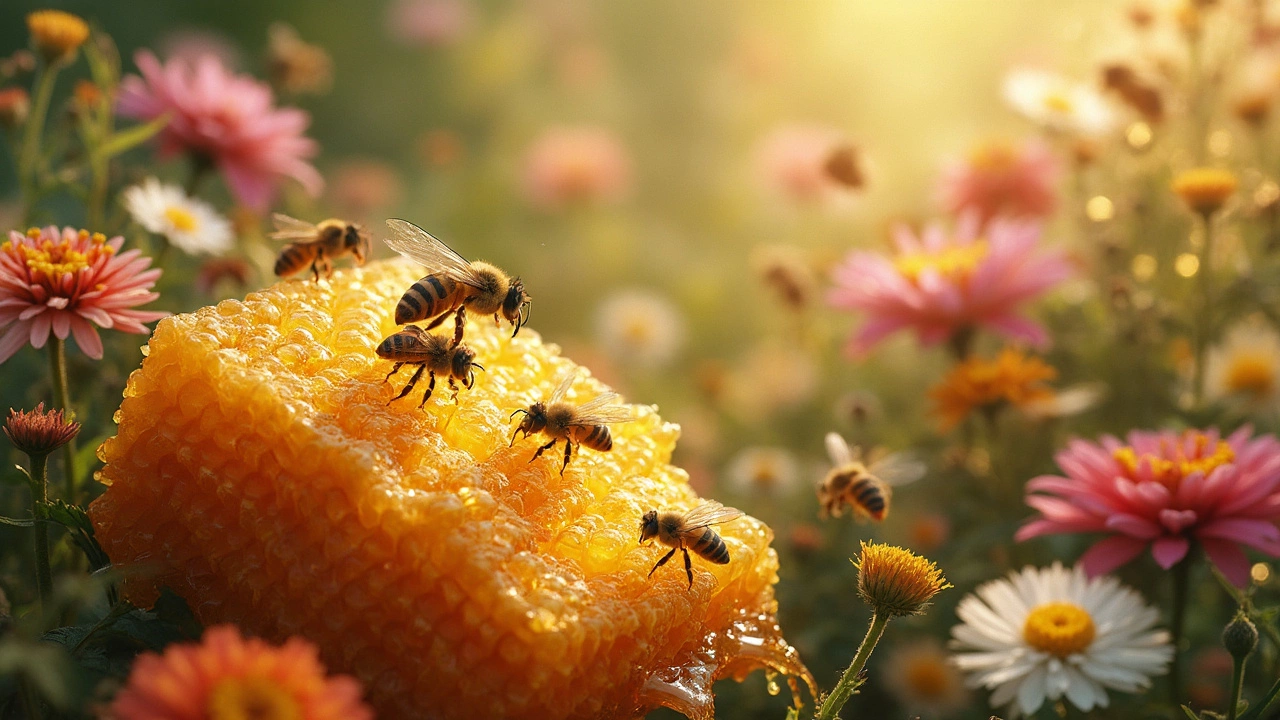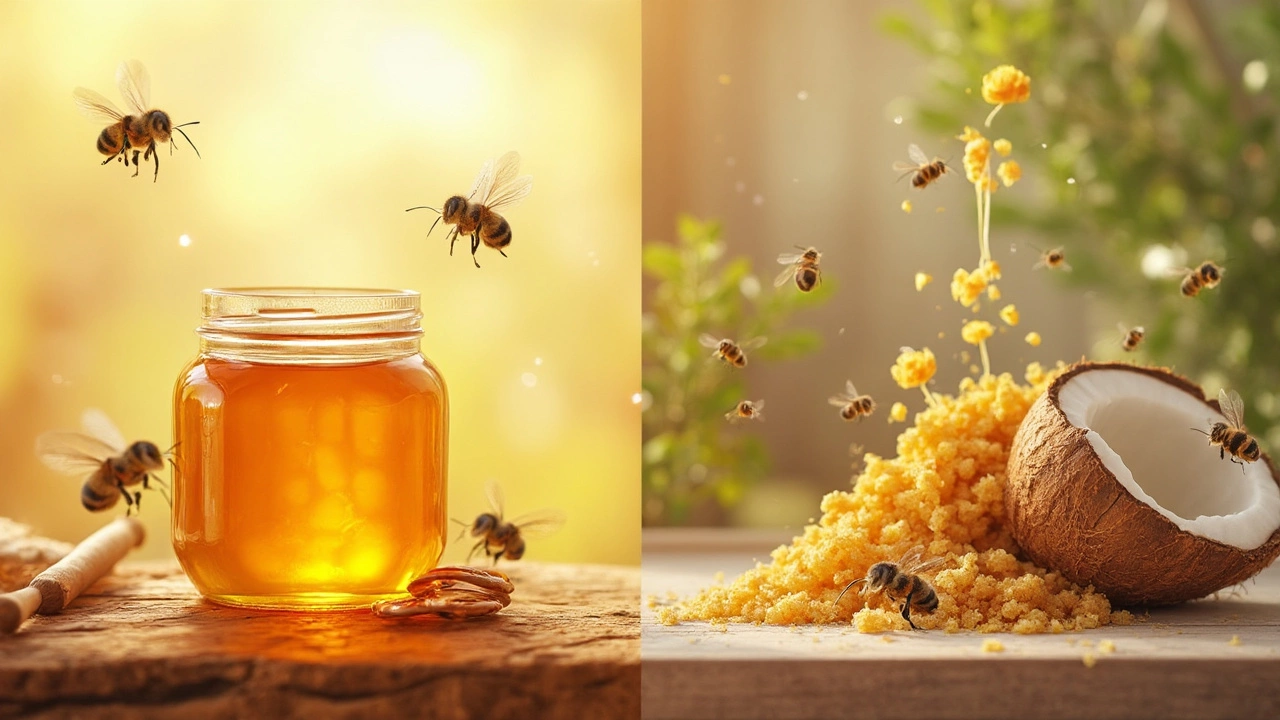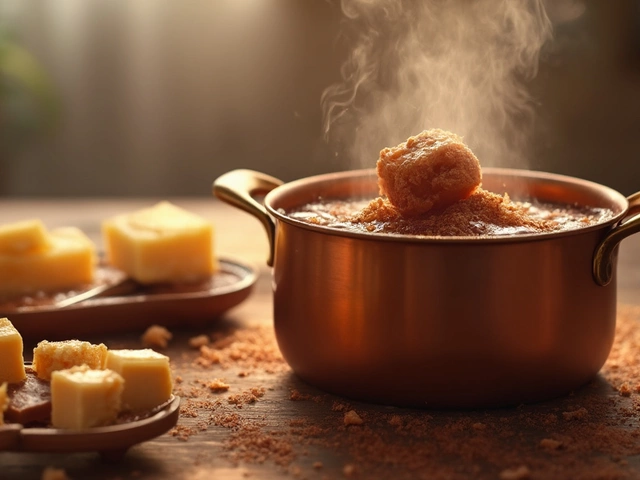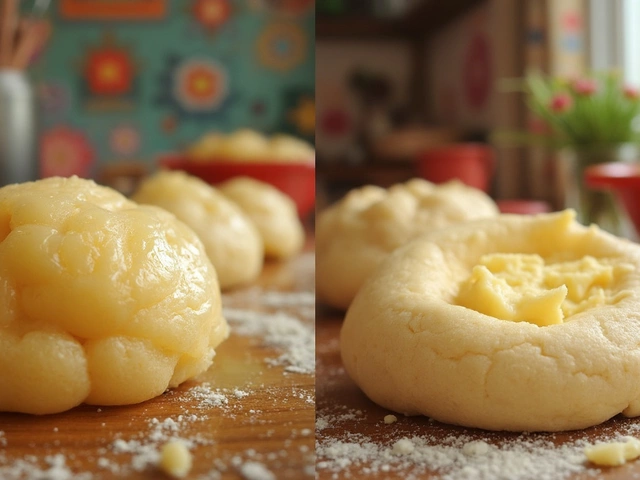
So, you’ve found yourself wondering if honey is vegan, huh? It might seem pretty straightforward at first—it's just a natural sweetener bees make, right? But, for those of us who want to stick to a strictly vegan diet, there's a bit more to it than that.
Honey, while natural, comes with the baggage of bee labor. Bees make honey by collecting nectar from flowers, processing it, and storing it in their hives. The process is quite fascinating, really. But, from a vegan perspective, the issue is that bees could be exploited in this process, much like any other animal used in production.
Why does this matter? Vegans are all about minimizing harm and exploitation of animals. When you think about how bees work tirelessly and humans swoop in to harvest and sell their honey, it becomes clear why many people on a plant-based diet choose to avoid it.
- Understanding Honey Production
- Why Some Vegans Avoid Honey
- Ethical Considerations of Beekeeping
- Vegan Alternatives to Honey
- Incorporating Alternatives in Desserts
- Sweet Treat Recipes Without Honey
Understanding Honey Production
Ever been curious about how honey magically appears at the supermarket? Well, it starts with bees, our little buzzing friends. They kick off the process by collecting nectar from blooming flowers. This nectar is their ticket to making that sweet, sticky gold.
Bees have these remarkable 'honey stomachs' where nectar mixes with enzymes, breaking down into simple sugars, mostly glucose and fructose. Afterward, they head back to the hive and pass the nectar around with their colony mates, each bee adding more enzymes along the way. Eventually, it gets stored in honeycomb cells.
Now, bees are clever. They fan their little wings to dry out the nectar until it thickens into honey. Once it's just right, they seal the cell with a wax cap, just like putting a lid on a jam jar. It’s this process that produces such a deliciously versatile sweetener.
How Beekeepers Harvest Honey
Beekeepers, or apiarists, sneak into the mix here. They carefully remove honey-filled frames from the hive to harvest the end product. But it's not so simple. They have to ensure that they leave enough honey for the bees to eat. This keeps the colony healthy and buzzing.
The frames are spun in a centrifuge to extract honey without damaging the comb. This sweet juice is then filtered to remove unwanted bits like wax or bee parts. The end product is raw honey, ready to be bottled up and sold.
If you’re a fan of raw, keep in mind it’s the least processed form and retains the most nutrients. On the other hand, pasteurized honey is heated to remove yeast, making it smoother but slightly less nutritious. Both types line the shelves of supermarkets, giving consumers options based on their taste and health priorities.
In essence, honey production is a mix of nature’s brilliance and human curiosity. It's a perfect team effort if you look at it from a certain angle.
Why Some Vegans Avoid Honey
So, let's dig into why the vegan community generally steers clear of honey. At its core, veganism is about avoiding animal exploitation and cruelty. This means all animals, even the tiny, often overlooked bees. You might wonder, are bees really exploited? Well, let's look at some facts.
Commercial beekeeping is a big industry, and not all of it has the best interests of bees at heart. Bees in these settings are treated more like honey-making machines rather than creatures with their own lives and needs. When honey is harvested, it means we're taking away the food they've worked hard to gather. Beekeepers often replace it with sugar syrups, which don't provide the same level of nutrition.
Impact on Bees
Another issue is the stress and harm that can come to bees during the honey production process. Hive management practices often involve manipulating groups of bees, which can lead to injuries or even death for some. It might surprise you, but queen bees are sometimes artificially inseminated, a process that’s not exactly natural or kind in nature.
The Ethical Standpoint
For many who adhere to a plant-based lifestyle, it's not just about what happens to the bees. It's about the bigger picture, too, which includes industrial-scale practices affecting our ecosystems. Bees play a crucial role as pollinators, and their health impacts the whole environment. Methods that harm bees can also have far-reaching consequences for biodiversity and food production.
Those who follow a vegan diet often choose to avoid honey altogether because the ethical and environmental issues make it a no-go zone for a lifestyle aiming to cause minimal harm. Exploring vegan alternatives to honey is typically the next step for those adhering to a vegan philosophy.
Understanding these nuances is crucial for making informed choices about what you add to your vegan desserts.
Ethical Considerations of Beekeeping
When we talk about the ethics of beekeeping, it comes down to how much we're prioritizing the well-being of the bees. It’s essential to know that not all beekeeping practices respect the natural behavior and life cycle of bees.
One major concern is the exploitation of bees. They're often perceived just as honey producers, but they're vital pollinators contributing to biodiversity. Bees travel over 55,000 miles to produce just one pound of honey, highlighting their extraordinary effort that often goes unappreciated.
Commercial Beekeeping Issues
Commercial and large-scale beekeeping can be problematic. Bees might be fed sugar substitutes instead of letting them enjoy the fruits of their hard work—this can weaken the bees over time because they miss out on their natural nutrients. Moreover, queen bees might have their wings clipped to prevent swarming, or may be replaced to increase productivity.
Stress factors like transportation for pollination services also complicate things. Imagine being uprooted constantly! This can diminish bee health and contribute to colony collapse disorder, an ongoing global issue.
Sustainable and Ethical Practices
Ethical beekeepers focus on sustainable practices that support bee health. They allow natural swarm behavior and ensure bees have plenty of stored honey for winter. Organic management also minimizes chemicals' impacts, keeping bees healthier.
Vegan enthusiasts believe supporting these practices, or switching to plant-based alternatives, can really make a difference. It's about finding harmony with nature rather than exploitation.

Vegan Alternatives to Honey
So, you’re on the hunt for some vegan alternatives to sweeten up your life without the bee business. Great news—there are plenty of options out there that are both satisfying and kind to the planet. Let’s dive into some popular picks that often find their way into vegan desserts.
Agave Nectar
This syrup is probably the most well-known honey alternative. Sourced from the agave plant, it’s sweet and smooth, making it perfect for drizzling over pancakes or stirring into tea. It's even sweeter than sugar, so you’ll need less to achieve the desired taste. Plus, agave has a lower glycemic index, which means it won’t spike your blood sugar as quickly as regular sugar.
Maple Syrup
Ah, maple syrup—the classic pancake partner. It’s not just for brunch anymore. Though it's pricier than other alternatives, its deep, rich flavor can add a unique twist to your homemade sweets. Just be sure you’re getting the real stuff—some brands sneak in non-vegan stuff like butter flavoring.
Date Syrup
If you haven’t tried date syrup yet, it’s about time. Made from concentrated dates, it packs a ton of sweetness with the added bonus of fiber and nutrients. It’s a bit more intense in flavor, so it works wonders in hearty baked goods like brownies.
Coconut Nectar
This sweetener comes from the sap of coconut blossoms. It’s another lower-glycemic option that provides a subtly sweet and fruity flavor. It’s sustainable too—coconut trees require little water and yield nectar consistently, making it an eco-friendly choice.
| Syrup Type | Glycemic Index |
|---|---|
| Agave Nectar | 15-30 |
| Maple Syrup | 54 |
| Date Syrup | 46-55 |
| Coconut Nectar | 35 |
Brown Rice Syrup
It’s not as sweet as others, but brown rice syrup adds a mild, caramel-like flavor that works well in granola bars and cookies. While it has a higher glycemic index, it serves as a good binder in recipes where texture matters.
Baking without honey doesn’t mean cutting out sweetness or flavor. Next time you're preparing your vegan dessert, try experimenting with these alternatives. You might just find a new favorite ingredient!
Incorporating Alternatives in Desserts
When it comes to making desserts without honey, it’s all about finding the right vegan substitute that matches the sweetness and texture you need. Luckily, there are plenty of great options out there!
Popular Honey Replacements
Let's start with some tried-and-true plant-based alternatives. Agave syrup is a popular choice because of its sweetness and smooth texture. It's derived from the agave plant, making it 100% vegan.
Another good option is maple syrup, derived from maple tree sap. It's got a distinct flavor, rich sweetness, and it’s as natural as it gets! Date syrup is another one; it's made from real dates and offers a lovely caramel-like taste.
But don’t forget about coconut nectar! It’s harvested from the sap of coconut blossoms and has a mild, sweet flavor, perfect for all your dessert needs.
How to Use Them in Recipes
So, how do you integrate these vegan alternatives into your dessert recipes without compromising on flavor or texture? Here are some tips:
- Agave Syrup: Use it in raw desserts, like raw vegan cheesecake or energy balls. It mixes well without the need for heating.
- Maple Syrup: It's excellent for baking. Try it in cookies, cakes, or even granola.
- Date Syrup: Ideal for drizzling over pancakes or waffles. Its rich flavor can enhance simple desserts.
- Coconut Nectar: Use it for making caramel sauces or as a sweetener in chocolate recipes.
Key Ratio Adjustment
A quick tip when substituting any honey alternative—usually, you can swap them one-to-one. However, always taste and adjust. Each syrup has its own sweetness level, so you might need to tweak the amount slightly.
Pro Tip: Keep in mind that these liquid sweeteners might alter the moisture content in baked goods. You sometimes need to adjust the dry-to-wet ingredient ratio for optimal results.
By getting creative with these syrupy friends, you can whip up vegan desserts that are not only kind to bees but fully satisfy your sweet tooth!
Sweet Treat Recipes Without Honey
Craving something sweet but want to skip the honey? No sweat! There are plenty of amazing alternatives that fit perfectly into a vegan lifestyle. Let’s check out some delightful ways to sweeten your desserts without using actual honey.
Maple Syrup Magic
First up, we have maple syrup. This classic is great not just for pancakes but for desserts, too. It adds a rich, caramel-like flavor. Ideal for baking, you can substitute maple syrup for honey in equal amounts.
Agave Nectar: A Sweet Substitute
Another popular choice is agave nectar. Made from the agave plant, it has a milder taste which works well in recipes where you don’t want the sweetener to overpower other flavors. It's slightly sweeter than honey, so start with a little less and taste as you go.
Coconut Nectar: Island Vibes
Coconut nectar is a wonderful option, with a taste that has a hint of tropical goodness. It’s low on the glycemic index, making it preferable for those mindful of sugar levels.
Recipe: No-Honey Vegan Granola Bars
- Preheat your oven to 350°F (175°C).
- Mix 2 cups of rolled oats, 1 cup of mixed nuts, and 1/2 cup of dried fruits in a large bowl.
- In a saucepan, warm up 1/4 cup of maple syrup and 1/4 cup of almond butter until they blend smoothly.
- Combine the syrup mixture with the dry ingredients and stir well.
- Spread the mix evenly on a baking sheet lined with parchment paper.
- Bake for 15 minutes or until lightly golden.
- Let them cool before cutting into bars.
There you have it! A deliciously crunchy treat that’s perfect for snacking without any honey. Whether you’re using agave, maple syrup, or coconut nectar, you can whip up sweets that are both tasty and vegan. Enjoy experimenting!





